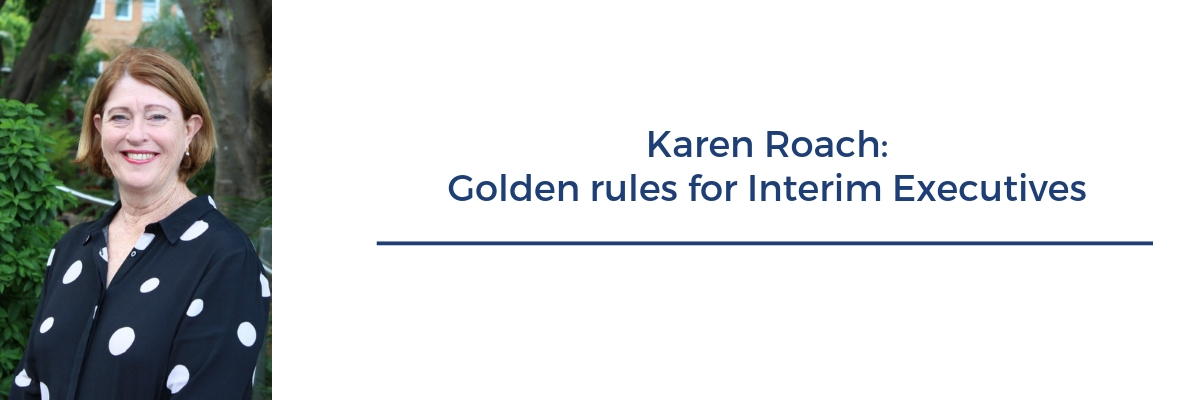5 Golden rules for getting the job done: Interim Executive work
27 Jun 2019

Increasingly organisations are hiring to get a job done. Rather than generate a field of candidates to compete with one another for a role, organisations are looking at knowledge, skills and expertise to drive value. And frequently that value is being driven through contingent executives and outsourcing.
Karen Roach, HardyGroup Learning Set Facilitator and Principal, Roach Consulting stepped back from big system CEO roles a few years back. If she thought she was going to be taking it easy, it didn’t work out that way.
Karen has recently commenced in another Interim Executive role as Chief Operating Officer for Queensland Health.
I asked Karen about some of her golden rules and how she approaches these assignments.
Kevin: When you are to start an Interim CEO or Interim Executive role for 3 – 6 months, what questions do you ask to get a briefing about the role?
Karen: I always like to get the CEs view of the organisation’s performance and culture at that point in time and what is the climate around the Board and the Department.
Who are my direct reports and are any of them in an acting capacity?
Apart from the key roles and responsibilities of the COO (The role I am currently in), are there any other specific expectations of the role?
What are the key challenges and risks from the CE perspective?
Who is my Executive Assistant, how long have they been in the role? A good Executive Assistant is worth their weight in gold, especially if they know the services well.
Kevin: When you meet the team on day one, what do you want to know from them?
Karen: As a team I would firstly introduce myself and ask a little about each of them, if I do not know them, if my Interim role is because of displacement, I allow some time for people to comment on how this has affected the team, but would not allow them to dwell on it.
I want to know what drives them and what they see are their key issues/challenges during the time I am in the role
I always deal with the “no surprises” rule.
Kevin: What do you concentrate on in the first week?
Karen: Often the first week is spent just getting to know the facilities and key staff. I am always conscious that many key staff including clinicians do not report directly to the COO, but these relationships are central to my understanding and being able to build credibility within the services
Kevin: Given the world, the role might look a little different after week one. You might want to discuss variations to the outcomes. How do you do that?
Karen: I’ve never had any trouble re-negotiating with the CE a change of emphasis or priority. As you know things can change quickly in health and it is important to be responsive to risk as it arises. The CE may or may not be aware of where the risk lies and it is often when I dig a bit, that things become more obvious or more worrying less obvious, therefore needing immediate attention.
Kevin: What is non-negotiable for you when you consider and Interim Executive assignment?
Karen: Being able to get on and do the job and not be micromanaged. There is no point appointing a COO without the requisite consent from the CE to get on with things. If the accountability framework is unclear, then I ask for clear approval when I consider taking on the role. Often, delegations have been pulled back to the CE, and I always check that these have been or can be released at least to COO level.
Kevin: When you are wrapping up an assignment, what is important?
Karen: An exit interview with the CE and if necessary, a report outlining issues which have been addressed and what is still outstanding.
A proper hand over to the new COO is always a good idea but not always practicable. I always ensure that I have made contact with all direct reports and key staff to say goodbye, especially the EA and executive team.

